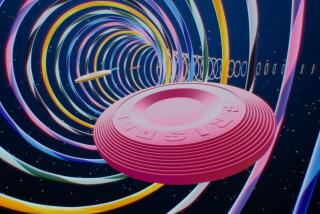Competition Goes to Root of Problem : Nature Company Sues Rival, Alleging Stores Are Clones
- Share via
SAN FRANCISCO — When Priscilla and Thomas Wrubel founded the Nature Company in Berkeley in 1973, they wanted a store where kids--and adults--could be kids, as they spun kaleidoscopes and admired geodes through magnifying glasses.
The Wrubels hit pay dirt. Their pioneering chain, now owned by a Boston company that also markets the high-flying NordicTrack exercise machines, has blossomed to 80 stores nationwide, with dozens more on the drawing boards and 10 in Japan. Annual sales have topped $116 million.
It’s little wonder, perhaps, that in 1987 a Bay Area upstart called Natural Wonders saw an opening for another player in the booming market for fossils, wind chimes, telescopes, model dinosaurs and other gear for nature lovers. It too has thrived, with 80 stores, scores more to come and annual sales approaching $90 million.
The only trouble is that the Nature Company finds its chief rival to be too much of a clone for comfort.
In a lawsuit filed last week in U.S. District Court in San Francisco, the Nature Company contends that Natural Wonders, based in Union City, copied the Nature Company name, its product mix and the layout and ambience of its stores, right down to the New Age background music and the salesclerks’ green aprons.
Even those who should know better have been confused, the Nature Company says. The suit, which seeks $10 million in damages, refers to a Natural Wonders assistant manager who reported to work at the Nature Company store in the same mall.
The suit accuses Natural Wonders of accelerating its infringement in the last two years, when the companies have been attempting to negotiate a solution out of court.
Natural Wonders, naturally, scoffs at the claims and plans to consider a counterclaim.
“It appears that the Nature Company and CML Group, its parent, are not interested in any competition,” says Rob Rubenstein, co-founder, president and chief executive of Natural Wonders.
An attorney for the Nature Company declined to discuss the suit.
The Nature Company’s lawsuit is part of a trend in trademark law, says Robert Lind, a law professor at Southwestern University School of Law in Los Angeles. “It’s becoming more popular,” he says, to challenge rivals on the issue of “trade dress,” which goes beyond trademarks to cover such things as advertising and packaging.
Some observers might say the Nature Company has a legitimate bone to pick with Natural Wonders. The stores are similar, but they are more fraternal than identical twins.
Both have tiles and carpeting, wooden display cases and open bins that invite shoppers to play with bird calls and other gizmos. The two chains carry many of the same items at nearly identical prices.
However, whereas the Nature Company outlets feature fountains, a hushed, museum-like atmosphere and dappled lighting meant to evoke a forest, the slightly smaller Natural Wonders stores are brighter, more open and more conducive to hands-on play. The average sales per ticket at Natural Wonders are about $15, compared to $25 at the Nature Company.
Given their heavy presence in California, both chains have suffered from the recession, but for most of 1992, Natural Wonders has eked out low single-digit sales gains at stores open at least a year, whereas the Nature Company has reported mostly declines. Both chains are profitable.
Financial analysts maintain that there’s scarcely need for a survival-of-the-fittest battle. With the public’s increased awareness of the environment and interest in nature, they say, there’s plenty of room for two nationwide competitors, especially since Natural Wonders is going after a less-affluent customer and, for the most part, finds locations in less upscale malls.
If East Bay shopper Elaine Caruana is any test, customers recognize and appreciate the similarities and differences.
“They seem very similar to me,” Caruana says outside the Natural Wonders shop in Concord’s Sunvalley Center mall, where the two stores coexist a few doors from each other. “But Nature Company caters a little more to higher-income customers.”
It also, in her opinion, “had a better interior decorator.” Caruana values both stores for carrying whimsical and unusual merchandise seldom found in department stores.
But in its complaint, the Nature Company maintains that many shoppers are confused. It notes that customers who buy items at Natural Wonders often attempt to return them at the Nature Company.
Occasionally, customers in the Nature Company make their checks out to Natural Wonders.
Within the last six months, the complaint contends, Natural Wonders copied “in substantial detail” a special Nature Company display of butterfly larvae.
Rubenstein, who co-founded Pic-a-Dilly Stores and Athletic Shoe Factory and then sold them to larger companies, acknowledges that the Nature Company established the nature and science niche.
He denies, however, that Natural Wonders set out to confuse anyone. The company went public in May and has been financing store openings with the proceeds.
“We believed that by having popular prices and more appealing stores, we could open more (locations),” he says. Rubenstein contends that Natural Wonders’ commercial success, rather than its trademarks and store designs, prompted the lawsuit.
More to Read
Inside the business of entertainment
The Wide Shot brings you news, analysis and insights on everything from streaming wars to production — and what it all means for the future.
You may occasionally receive promotional content from the Los Angeles Times.









